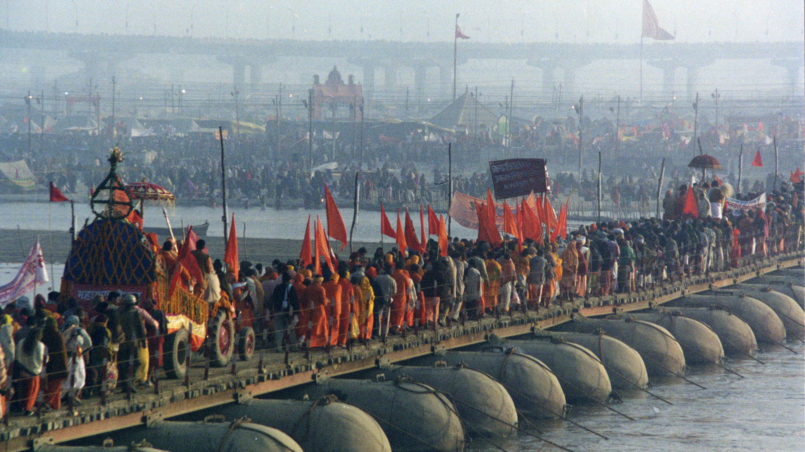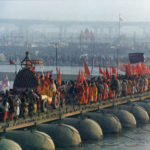Prometheus’ Consolation

Or: Why, despite everything, we all deserve a future …
Prometheus, Titan, the fore-thinker, friend and bringer of culture to the people – for which Zeus, the father of the Gods, made him suffer terribly …
Memory of one of my heroes
In the rest of Rome and in the colonies of his children, it was the year 1990. The summer monsoon was bidding farewell and the rest of our small group had only recently left the occupied Lhasa in a government plane heading south east. Apart from the epileptic fit of a fellow passenger (over the summit of Chomolungma) and the sonorous singing of the rotors, it was totally silent on the plane. The long journey from one end of a Tibet under martial law to the other had indeed taken its toll.
Months before leaving London, I knew that I wanted to make a stop in Calcutta on our way to the Andaman Islands and now, after having seen the genuine Kalika in one of the mountain monasteries which had not yet been infiltrated by the Chinese, I simply had to go to their city. Alan, my travel companion, had already been there in 1964 when he was en route to Burma and he showed little enthusiasm at the thought of spending a “holiday” in Calcutta.
But Alan, a good soul, surrendered to my naive enthusiasm and, after overcoming the usual hurdles which spontaneous and improvising travellers face, we landed in Kalikata at 5 in the morning. In a city whose name translates to “Black Gate”. En route, Alan, whose methods were often a mystery to me, had somehow managed to book a room in the colonial Fairlawn Hotel. He was apparently tired of sleeping on clayey floors, of the dirty wash hand basins and of the squat toilets and now we had to somehow find our way from the airport to Sudder Street.
When we left the airport building, more or less alone, I had to catch my breath. After the first few days in Delhi, the endless trips on public busses through the north to Pokhara and further across northern India, on foot over the border to Tibet, etc, I would have thought that the continent could no longer shock me.
The red-orange morning light, diffusely wafting in streaks, stung my eyes and through tears I could vaguely see and yet only too clearly, dark silhouettes … a vast number of shapes, on crutches, useless limbs dragging behind, crawling along the ground, hands outstretched to us, hanging on building fences, one on the shoulders of another, and on those shoulders yet another, and again the high fences, bending from this human burden …
An enterprising taxi driver pushed his colleagues and the rest of the welcoming committee to the side and thrust us into his vehicle which already in its time, was historically valuable and drove through the middle of the masses, who were surging against the vehicle. Alan had buried his face in his hands and remained seated, breathing heavily and crouched for the entire, painfully slow journey.
The city of my dreams passed through the open window. Humans upon humans at the side of the road and in the ditches, tiny fires every few metres, some with dented kettles above manure-fed embers, families with many young children, babies, lying directly on the asphalt, wild dogs, crowded into kilometres, some barely awake, others still outstretched in their sleep in their rags.
In the middle of a crossroads somewhere along the way into the city centre, a rotting pile of rubbish rose up. On top there was a cow which was eating and on it a crow which was ripping pieces out of the bony back of the holy animal with its beak … I felt as if they were all just staring at me.
One day a general, a leftover from the British Raj, and his entourage invited us for brunch. Course for course, glass for glass, I observed the silent dance of the servants in their pearly-white uniforms, gloves and turbans (adorned with a small peacock feather above the forehead) as they elegantly juggled the real silver plates through the cosy inner court and I felt sick.
I ran out and, when I was standing in front of the building, not knowing where to go, I noticed a man looking at me. He lay on the opposite side of the street, on the chipboard floor of a fruit box to which castors from a shopping trolley had been added at the four corners. From the pelvis, the man had no legs, both arms were missing until his shoulder, in his toothless mouth he held a wooden begging bowl.
In panic, I turned right and ran into the hustle and bustle of the busy masses, around a corner and yet another and… there he lay, directly in front of me, below me. Our eyes met, I somehow overcame my shock and instinctively turned out the pockets of my kurta, I had nothing with me. No rupees, no crumbs of anything edible, no piece of anything, simply nothing.
He clearly recognised how I apologetically turned away, ashamed of myself. He let his begging bowl fall onto his chest, casually shrugged his shoulder stumps and smiled at me so widely and openly that I had to laugh with him. He then picked up his bowl again, leaned on his side, pushed himself off the asphalt with his shoulder blade and back and rolled away like a shot through the legs of passers-by on his fruit case …
Translation into English: Donna Stockenhuber
Credits
| Image | Title | Author | License |
|---|---|---|---|
 |
kumbh_mela2001 | Yosarian | CC BY 3.0 |

Well written, very descriptive and I could almost picture the situations. I had tears in my eyes reading about the man with the fruit case, one of so many. Terribly depressing for me and I know I would not even be able to step foot into some rich person’s house, knowing and seeing all the poverty outside. Keep writing!